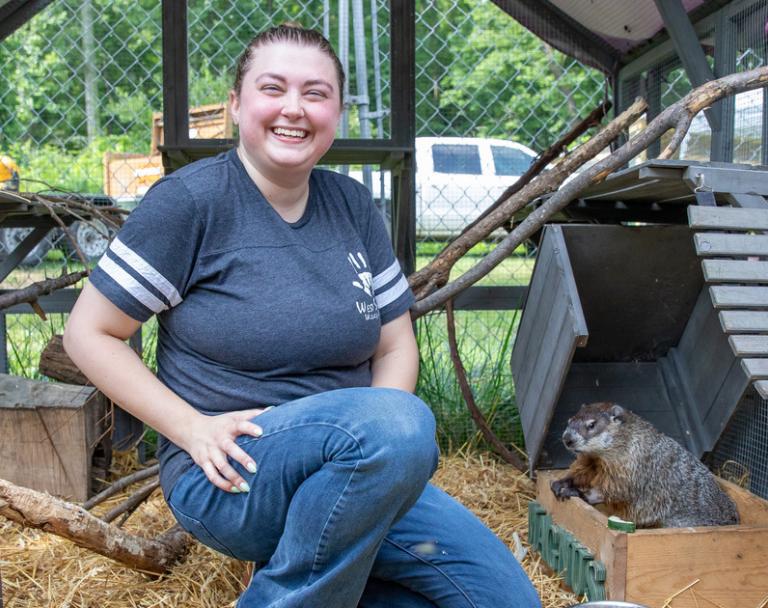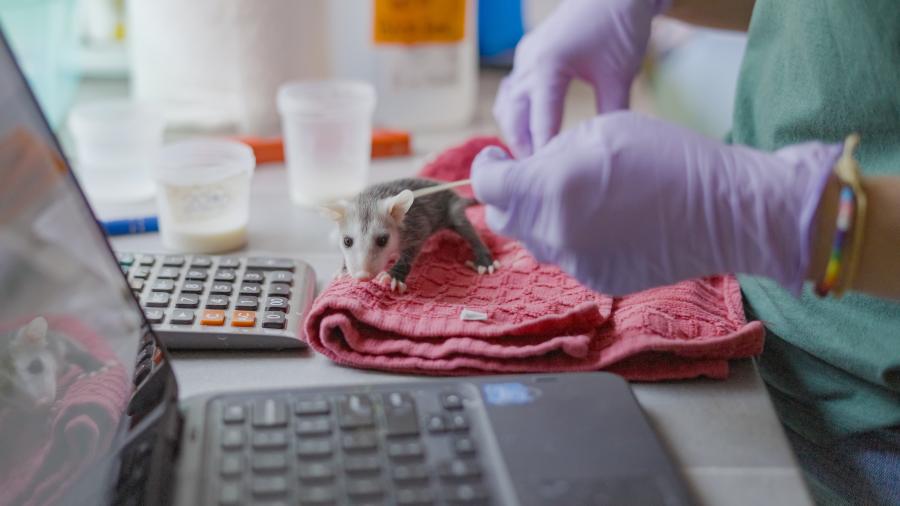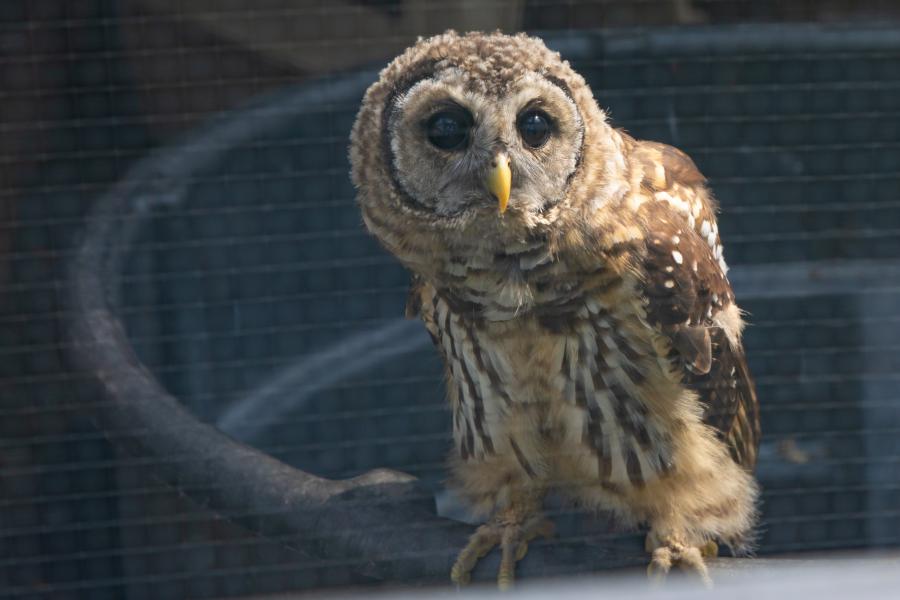Meet Emily Garrigan ‘17: Founder of York County’s Only Wildlife Rehabilitation Center

Eight years after graduating, this YCP alumna shares the story of founding her very own injured wildlife rescue, the challenges she’s faced, and her hopes for the future.
When Emily Garrigan ‘17 began her journey at York College of Pennsylvania, she knew she wanted to study science and help others who needed healing, so Nursing seemed like the obvious path.
However, through her coursework and clinicals, Garrigan discovered that her calling was not in the medical field. Rather, she found that her passion was caring for Pennsylvania’s wildlife.

Following this passion eventually led Garrigan to open the West Shore Wildlife Center in Dover, PA, a wildlife rehabilitation and conservation education nonprofit. Over the span of nearly six years, the organization has evolved into a full-fledged operation that takes in sick, injured, or orphaned animals with the goal of releasing them back into the wild.
West Shore Wildlife Center hopes to continue promoting healthy relationships between people and the environment through its programs and works to rehabilitate the animals that it takes in so that they can return to living freely.
The Pivot from Nursing to Biology
The daughter of two York College alumni, Garrigan knew she wanted to stay close to her hometown of New Oxford and attend her family’s alma mater, so she enrolled with the plan of becoming a nurse.
In a previous interview, Garrigan shared that her hands-on experience helped her see that nursing wasn’t the right career path for her. However, since the curriculum included many biology courses, the switch to a Biology major wasn’t too difficult.
This decision ultimately led Garrigan to get the exciting experience she needed to pursue a biology career in wildlife rescue.
“My biggest experiences were in those last two years, doing my capstone research,” Garrigan said. “I was an intern at Raven Ridge Wildlife Center at the time, which is really what got me interested in this field. I got to do my own research project there. And, with my mentor, we actually published that research after I graduated.”
Following her 2017 graduation, Garrigan worked as an educator at Zoo America in Hershey, PA, where they specialized in North American animals. She then moved to Erie to work at the Tamarack Wildlife Center.
“They specialize in bald eagles and a lot of birds of prey,” she said. “And I was there for about a year, and then really found that I was homesick. So I moved back home. And that’s really where I started rehabbing on my own and eventually founded the wildlife center.”
Along with the experience she gained working briefly at Eurofins Lancaster Labs in Lancaster (a biopharmaceutical company and popular place for York College biology and chemistry graduates to work their first jobs), Garrigan soon learned how to become a wildlife rehabilitator in Pennsylvania while running the center in her own home. It wasn’t long before the West Shore Wildlife Center expanded its capacity and began helping a wider variety of animals.
Life at West Shore Wildlife
Garrigan founded the West Shore Wildlife Center in 2019 with the help of her husband and a handful of volunteers. They are a 501(c)(3) non-profit organization, fully funded by donors, and do a variety of educational and outreach work and programs at places such as schools and libraries. The rehabilitation center also maintains an online presence through an e-newsletter and social media to help educate people on how to better coexist with the wildlife in the Pennsylvania area.
“As far as wildlife goes, we take a little bit of everything,” Garrigan said. “We work with turtles, snakes, birds of prey, songbirds, waterfowl like ducks and geese, a lot of mammals. Our most common animals that we see are your common backyard species, like eastern cottontails [and] eastern gray squirrels. We do a lot of possums, but we get some more rare animals, too, like porcupines.”
Now, under Garrigan’s leadership as executive director, the organization is five years old, going on six, and growing rapidly. The center moved to a new location in Dover in January 2024, and are seeking ways to expand their staff and facility to accommodate more patients, while continuing to be a reliable wildlife hotline in York County, PA.
“Often, we just don’t have the space or the enclosures for them yet,” Garrigan said.” So that’s really our big goal. And our strategic plan for the next five years is to keep building new outdoor enclosures, to keep building up our inside space, [and] keep building up our volunteer team. We also hope, once we’ve grown our rehab program to meet the need in our community, to keep growing those education initiatives and how we work with conservation partners, like the Game Commission, Audubon Society, things like that as well.”
Continuing the York College Connection
When it comes to volunteers, the West Shore Wildlife Center can always use more hands. Thanks to its proximity to campus, York College students interested in conservation or working with wildlife often complete internships at the center. The organization provides plenty of fieldwork opportunities for biology students, but it has attracted students from other majors as well.
“We see a lot of students that are pre-vet, or they want to get into working with the Game Commission or in zoos and things like that,” Garrigan said. “It’s most of the students that we see that really need that hands-on animal experience, and then can take that on to [wherever they go]. Whether they work with wildlife, domestic animals, [or] people, that experience carries through.”
Dr. Bridgette E. Hagerty, Associate Professor of Biology and Garrigan’s thesis mentor, now serves on the organization’s Board of Directors, offering her support and guidance.
“Emily’s dedication to the wildlife of Pennsylvania is inspiring,” Dr. Hagerty said. “While working on her research project with me in the Biology department—I clearly remember her telling me that her goal was to open her own wildlife rehabilitation center. West Shore Wildlife Center is the realization of Emily’s vision and many long hours of extremely difficult work. Now I am proud to help fulfill the wildlife center’s mission as a member of the board of directors.”
Garrigan expressed that her favorite part of working at the West Shore Wildlife Center has been the variety of animals she encounters every day. Not only does her role allow her to play a vital role as the only York County wildlife center, but it also provides her staff and volunteers with the experience they need to pursue careers in conservation education or other nonprofit wildlife jobs in Pennsylvania.
“We never know what animals we’re going to see, what cases might come in,” she said. “We’re similar to an emergency room, where really anything could happen in any given day. And then I do really like the business aspects as well. So, not only do I still get to work hands-on with the animals all the time, but I also get to do some of the back-end things like fundraising, go out in the community working with conservation partners, and that’s been really rewarding as well.”
Success from Support
Garrigan made sure to express that the success of the West Shore Wildlife Center would not have been possible without the support of the people who helped her create the organization. Her husband, direct family, and the numerous volunteers—especially those who became staff members over the years—made the center what it is today.

Most of all, the community’s support played a major role in the organization’s growth and success. Whether it be those who bring in animals that need help, volunteer, or donate money or supplies for the animals being cared for, spreading the word about what West Shore does through actions has always made a huge difference.
“We wouldn’t have been able [...] to grow the way we have in five years if the community wasn’t ready to stand behind us and support us,” Garrigan said.
When asked about what advice she would give to anyone interested in career paths in wildlife management and rehabilitation, Garrigan shared that getting varied experiences is very important. Even if a person is unsure about what they want to do, volunteering and participating in wildlife center internships can make a world of a difference.
“You’ll always learn something about which direction you want to go,” Garrigan said. “The other piece of advice that I would give is just to pursue whatever it is that you’re passionate about.”
“Without the experiences that I had [at York College], I maybe wouldn’t have been in a career like this, [...] but that’s where I got to do an internship, and discovered the field of wildlife rehab and fell in love with it.”
To support Emily Garrigan and the animals in her care, visit the West Shore Wildlife Center website.




